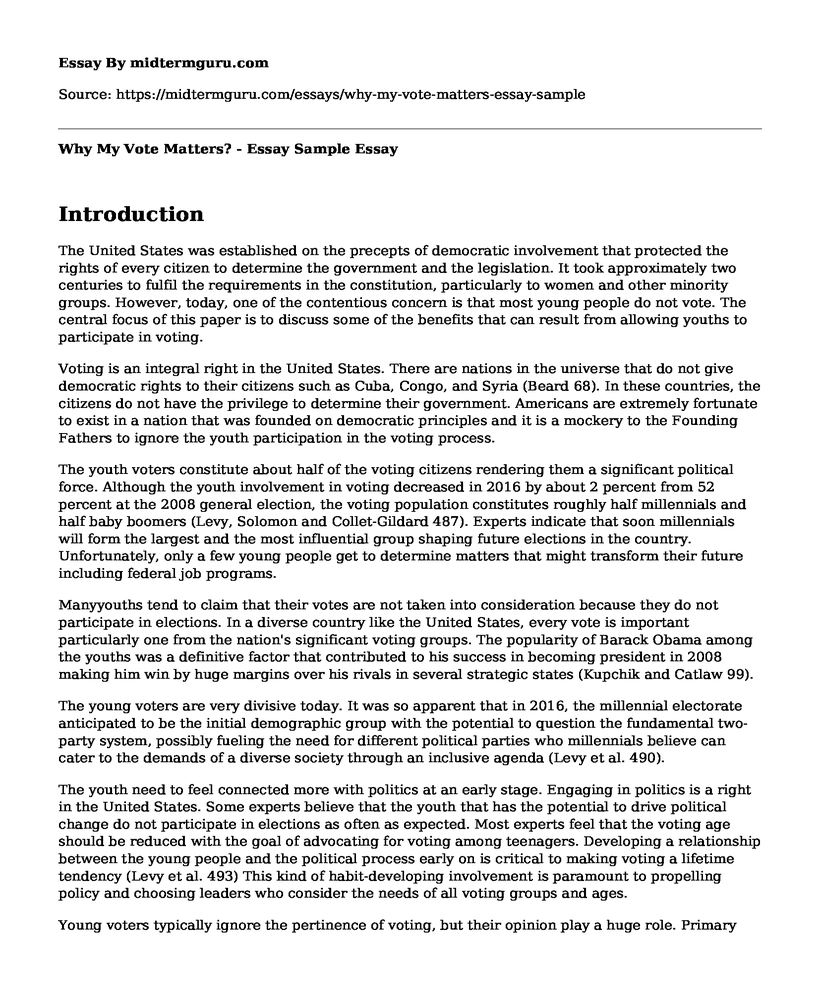Introduction
The United States was established on the precepts of democratic involvement that protected the rights of every citizen to determine the government and the legislation. It took approximately two centuries to fulfil the requirements in the constitution, particularly to women and other minority groups. However, today, one of the contentious concern is that most young people do not vote. The central focus of this paper is to discuss some of the benefits that can result from allowing youths to participate in voting.
Voting is an integral right in the United States. There are nations in the universe that do not give democratic rights to their citizens such as Cuba, Congo, and Syria (Beard 68). In these countries, the citizens do not have the privilege to determine their government. Americans are extremely fortunate to exist in a nation that was founded on democratic principles and it is a mockery to the Founding Fathers to ignore the youth participation in the voting process.
The youth voters constitute about half of the voting citizens rendering them a significant political force. Although the youth involvement in voting decreased in 2016 by about 2 percent from 52 percent at the 2008 general election, the voting population constitutes roughly half millennials and half baby boomers (Levy, Solomon and Collet-Gildard 487). Experts indicate that soon millennials will form the largest and the most influential group shaping future elections in the country. Unfortunately, only a few young people get to determine matters that might transform their future including federal job programs.
Manyyouths tend to claim that their votes are not taken into consideration because they do not participate in elections. In a diverse country like the United States, every vote is important particularly one from the nation's significant voting groups. The popularity of Barack Obama among the youths was a definitive factor that contributed to his success in becoming president in 2008 making him win by huge margins over his rivals in several strategic states (Kupchik and Catlaw 99).
The young voters are very divisive today. It was so apparent that in 2016, the millennial electorate anticipated to be the initial demographic group with the potential to question the fundamental two-party system, possibly fueling the need for different political parties who millennials believe can cater to the demands of a diverse society through an inclusive agenda (Levy et al. 490).
The youth need to feel connected more with politics at an early stage. Engaging in politics is a right in the United States. Some experts believe that the youth that has the potential to drive political change do not participate in elections as often as expected. Most experts feel that the voting age should be reduced with the goal of advocating for voting among teenagers. Developing a relationship between the young people and the political process early on is critical to making voting a lifetime tendency (Levy et al. 493) This kind of habit-developing involvement is paramount to propelling policy and choosing leaders who consider the needs of all voting groups and ages.
Young voters typically ignore the pertinence of voting, but their opinion play a huge role. Primary issues in every election that have taken place progressively relate to the issues of youths, making it mandatory for individuals falling within that group to enlighten themselves on political matters and actively participate during the elections.
Works Cited
Beard, Charles. An Economic Interpretation of the Constitution of the United States. Routledge, 2017.
Kupchik, Aaron, and Thomas J. Catlaw. "Discipline and Participation: The Long-Term Effects of Suspension and School Security on the Political and Civic Engagement of Youth." Youth & Society 47.1 (2015): 95-124.
Levy, Brett LM, Benjamin G. Solomon, and Lauren Collet-Gildard. "Fostering Political Interest among Youth during the 2012 Presidential Election: Instructional Opportunities and Challenges in a Swing State." Educational Researcher 45.9 (2016): 483-495.
Cite this page
Why My Vote Matters? - Essay Sample. (2022, Sep 07). Retrieved from https://midtermguru.com/essays/why-my-vote-matters-essay-sample
If you are the original author of this essay and no longer wish to have it published on the midtermguru.com website, please click below to request its removal:
- Essay Sample on Political Violence
- Relevance of the Capital Control Policies - Essay Sample
- Letter With Response on Article Perspectives for NATO-Russia Relations - Paper Example
- Research Paper on United States-China Trade War
- Research Paper on Isolationism
- Social-Psychological Dimension of International Conflict - Essay Sample
- Trump Immigration Ban - Essay Sample







